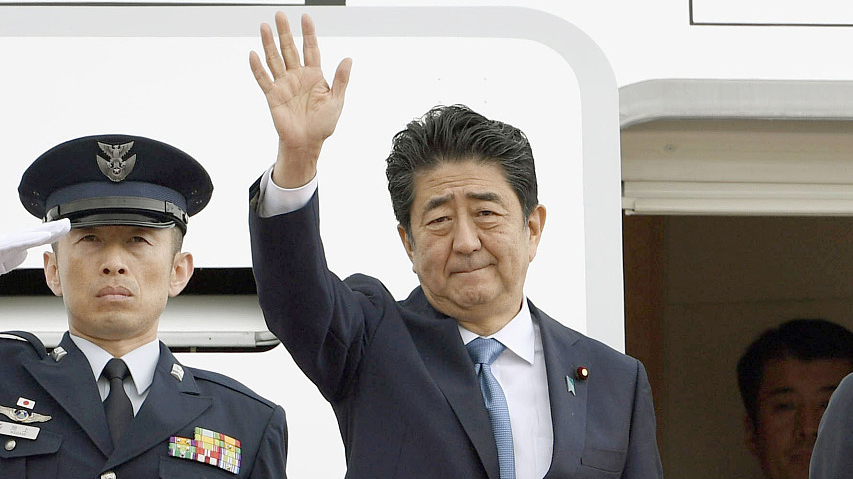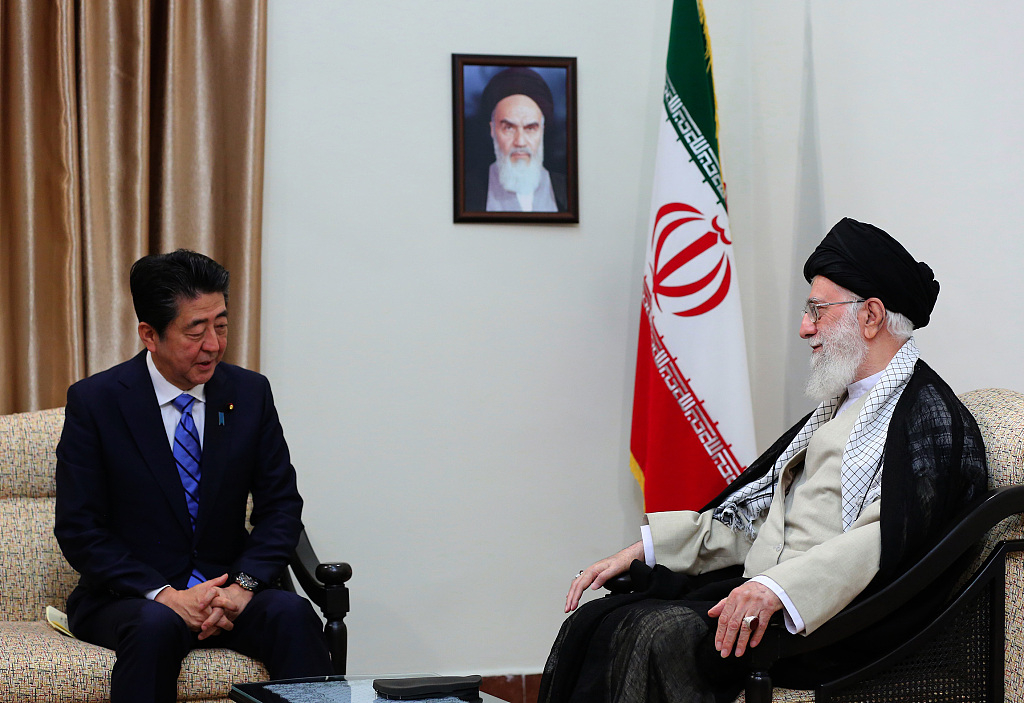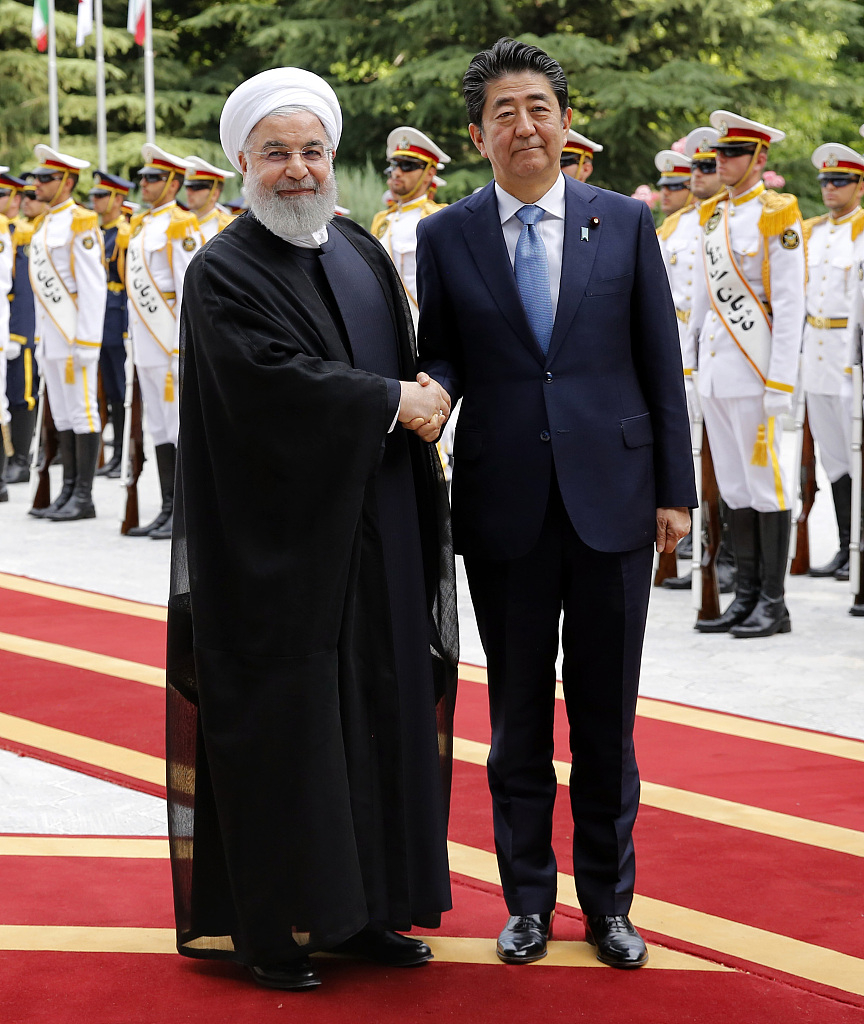

Editor's note: Bobby Naderi is a journalist, current affairs commentator, documentary filmmaker and member of the Writers Guild of Great Britain. The article reflects the author's opinion, and not necessarily the views of CGTN.
Japanese Prime Minister Shinzo Abe wrapped up his Trump sanctioned visit to Tehran on Thursday after meeting with Iranian President Hassan Rouhani and the country’s leader Ayatollah Ali Khamenei.
Addressing a joint press conference with Rouhani on Wednesday, Abe said his country aims to play a mediatory role in easing tensions, as peace and tranquility in the Middle East are very important for the entire world.
He said, "Japan seeks to play a maximum role to prevent tensions, and this has been the focus of my trip to Iran. Efforts should be made to avoid any military confrontation in the region."

Iranian Supreme Leader Ayatollah Ali Khamenei (R) meets with Japanese Prime Minister Shinzo Abe in Tehran, Iran, June 13, 2019. /VCG Photo
It is hard to believe the man who is busy militarizing his own country wants to play a mediatory role between Iran and the United States, or help Tehran avoid conflict with the United States, or to ease tensions that have threatened to plunge the Middle East into renewed chaos.
The man who admires President Trump and wants to revise Japan’s post-war, pacifist constitution, has some bad feet and his main fault is probably his growing tendency toward Trumpism and militarism. Article 9 of the Japanese constitution bans maintenance of armed forces, but Abe is revising it to allow a military for so-called self-defense. He wants to add a reference to the Self-Defense Forces, as Japan’s military is known, to clarify their status.
This is not a symbolic change, but one dangerously pursued by Abe and his conservative party members who see the U.S.-drafted constitution as a humiliating reminder of defeat in World War Two. He once famously said, "Isn’t it the mission of us politicians living today to create an environment in which SDF members can carry out their duties with a sense of pride? Let’s fulfill our mission by clearly writing in the constitution the Self-Defense Forces that protect peace and independence of Japan."
To that purpose, Japan has increased its military budget for the seventh year in a row, allegedly to counter threat from the Democratic People's Republic of Korea (DPRK) and China. It has boosted military spending by 2.1 percent to 47.6 billion U.S. dollars. This is a massive rise in military spending and a clear indication that Japan wants to militarize and eyes military adventures overseas.
Under Abe’s canon, Japan is developing domestically-made long-range anti-ship missiles. The development of such standoff missiles is hypocritical in terms of Japan’s exclusively defense-oriented policy, and Abe’s newfound pacifist diplomacy in the Middle East. It surely leads to the country’s acquisition of weapons that give its armed forces the ability to attack neighbors.
Japan is also building warships, destroyers and anti-submarine warfare platforms. It is buying 105 F-35 Lightning jet fighters from the U.S. which will fuel the arms race in Asia. The deal was confirmed during Trump's four-day state visit to Japan last month.

Iranian President Hassan Rouhani (L) shakes hands with Japanese Prime Minister Shinzo Abe in Tehran, Iran, June 12, 2019. /VCG Photo
No matter how uncomfortable or unprofitable that may be, Abe was re-elected as premier to wade into the fray, revise the pacifist constitution, militarize his country and make American arms manufacturers rich again. The irony of all this is that it comes at a time when relations between Beijing and Tokyo are at their warmest in years.
The problem with all this nonsense is that the mediatory path Abe took all the way to Tehran is a “future” in which Japan will never pursue a world without conflict, let alone decrease the risk of a miscalculation or “accident” that could lead to a war. It’s a future in which Japan will always have American fighter jets, destroyers and missiles ready to fly at a moment’s notice, even if this would put its own people at risk.
There can be little doubt that Abe is not leading by example when it comes to realism, restraint, and respect in the world. He has no real aspiration to renew himself at home and lead by example abroad. By trying to revise his country’s pacifist constitution and increase military spending, he is willing to run some risks. His foreign policy is not based on realism or a careful articulation of regional interests and global politics. By trying to mediate between Tehran and Washington, he only acted in good caution, hence shaming himself in front of newscasts.
Certainly, the missing link in Abe’s "historic" visit was the deliberate absence of awareness and connection to the common sense. He failed to understand the full horror of what has happened or will continue to happen to the region as a result of foreign military adventures, regime-change fantasies, and economic terrorism.
The dark forces are admittedly making plans for the day when the time is right. They have been given the order to supplant diplomacy, make peaceful resolution impossible and violent resolution inevitable. That’s exactly why they sanctioned Abe’s two-day visit but gave him nothing. During the press conference, there was no discussion – never even a mention – of mediation and gesture. Not a word, not a peep.
It's of little wonder Iran’s leader told him Trump is not worthy of a response. In his words: "We have no doubts about your goodwill and seriousness, but regarding what you quoted from the U.S president, I personally do not consider Trump worthy of exchanging any messages with, and do not have and will not have any response for him."
(If you want to contribute and have specific expertise, please contact us at opinions@cgtn.com.)

Copyright © 2018 CGTN. Beijing ICP prepared NO.16065310-3
Copyright © 2018 CGTN. Beijing ICP prepared NO.16065310-3